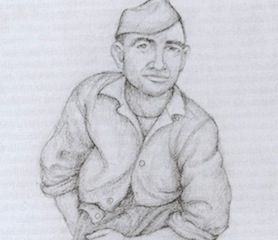|
J. William T. "Bill" Youngs, American Realities, Volume Two:
Historical Episodes from Reconstruction to the Present, Chapter Eleven |
"McCarthyism Political Cartoons" courtesy of the Library of Congress
|
11. The Cold War
|
SummaryThe career of Joseph McCarthy displays anti-Communism as a force in American history, particularly inthe decade following World War II. The article portrays Joseph McCarthy as an “all-American boy” whose career both shaped and was shaped by the Anti-communist movement. It also suggests that although freedom of speech is sometimes curtailed in the United States, the limitations tend to create their own reactions, as in the time of the Alien and Sedition Acts.
|
Author reads from the Text
American anticommunism began in the nineteenth century, before the world had its first Communist nation. After Karl Marx published the Communist Manifesto in Germany in 1848, his ideas circulated rapidly in Europe and the United States. Marx’s claim that the laborers of the world were cheated out of their fair share of industrial profits inspired a socialist movement in the United States during the latter part of the nineteenth century. The movement grew into several parties, diverse in program but alike in holding that the instruments of industrial production, distribution, and exchange should be owned by the people as a whole and managed cooperatively for the benefit of all rather than competitively for the benefit of a few. They looked at men like Andrew Carnegie as greedy oppressors: Why should Carnegie earn $25 million a year, when his workers earned less than $1,000?
The socialists advocated radical restructuring of American society. They ran several impressive presidential campaigns beginning in 1910, polling nearly a million votes for their candidate, Eugene V. Debs. But neither the socialists nor the Communist Party, which was formed later, could make much headway against a deep American antipathy toward what they regarded as foreign ideologies. Naturally the “captains of industry” were unfriendly to any doctrine that would deprive them of their wealth; most believed that business success was a reward from God for hard work. By 1900 they were already using the term “Communist” to condemn those who favored an income tax. And American workers, who might have supported socialism, were so imbued with the ideal of success through individual initiative that most regarded socialism and communism as exotic foreign doctrines, designed for people who were lazy and subversive, and not for American farmers and factory workers.
The socialists advocated radical restructuring of American society. They ran several impressive presidential campaigns beginning in 1910, polling nearly a million votes for their candidate, Eugene V. Debs. But neither the socialists nor the Communist Party, which was formed later, could make much headway against a deep American antipathy toward what they regarded as foreign ideologies. Naturally the “captains of industry” were unfriendly to any doctrine that would deprive them of their wealth; most believed that business success was a reward from God for hard work. By 1900 they were already using the term “Communist” to condemn those who favored an income tax. And American workers, who might have supported socialism, were so imbued with the ideal of success through individual initiative that most regarded socialism and communism as exotic foreign doctrines, designed for people who were lazy and subversive, and not for American farmers and factory workers.

